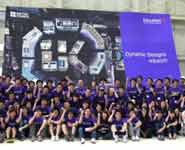The Dynamic Designs Challenge was developed by two earthquake engineers at the University of Bristol, Drs Wendy Daniell and Adam Crewe, in partnership with Education UK and the British Council. The final was held at the recently opened Seismic Centre at Pusan National University, South Korea last month [Thursday, July 23].
The Dynamic Designs Challenge is one of a number of marketing campaigns that have been developed in support of the Prime Minister’s Initiative for International Education (PMI2), a five-year strategy to support the UK in the international education market.
The competition required participants to demonstrate many of the core attributes and skills required by employers and universities including teamwork, creative thinking, communication and the ability to solve complex challenges. The students also applied skills in and knowledge of science and engineering, art and architecture, project management, finance and socio-economics.
Dr Wendy Daniell, Visiting Fellow, said: “This challenge required the participants to work in multidisciplinary teams to come up with design proposals for a new hospital. They had to consider not only the architectural and structural design of the building, but also its social and economic value to the local community. Furthermore, through their presentations they had to convince the imaginary client that he would see a good return on his investment in the hospital.
“This project demonstrated to students the wider aspects of the subjects they study and how they interlink with other disciplines when applied to real-life projects.”
Following the first stage of the competition, 12 teams were shortlisted from poster submissions to compete in the final. Twenty-nine teams of six undergraduate students from universities across South Korea took part in the first stage. The finalists had to give a presentation in English to a panel of expert judges and also make a structural model of the building within five hours. All 12 models were tested simultaneously on a specially designed ‘shaking table’ to see how they stood up to simulated earthquakes.
Dr Adam Crewe, Senior Lecturer said “There were some innovative designs for the structural models, with a number of teams being particularly creative in their use of materials for earthquake protection systems. Teams worked together in an organised manner to complete well-built models in the limited time. This high standard of models resulted in an all round good performance during the earthquake tests.
“Unfortunately only one team could win the award for the “Best performing model on the shaking table”, and that was “Sensation” from Hanyang University in Seoul. Sensation adopted a good earthquake resistant design that deserved to win.”
The overall winning team was Archineer from Yonsei University, who showed new ideas when creating their model and also gave a high-quality and professional presentation in English. The “Best design proposal presentation” was awarded to Fortress from Ajou.
The winning team was awarded a trophy for their university and team members received a brand new Netbook. An iPod Touch was given to each member of the “Best design” and “Best performing model” winning team. All students who took part in the challenge were awarded a certificate from Education UK and the British Council.
